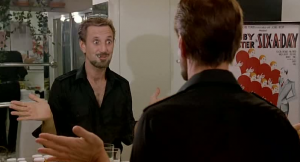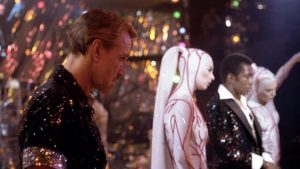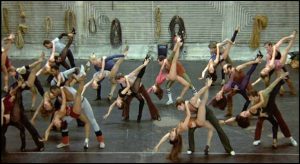A new year brings forth a new series and that series is “Retrolodeon.” For as much as I love reviewing new releases and discovering hidden gems in the indie circuit, I do miss plowing through my collection and devouring films of yesteryear. “Retrolodeon” is my solution to that dilemma, a weekly film review series with a bent on classic cinema. Well, classic may be a strong word, as the films I’ll be covering won’t always be a classic. There is no rhyme or reason to my selection. The only admission for entry into the “Retrolodeon” is an older release date.
The films will range from entries in the Criterion Collection to grindhouse favorites to peculiar oddities to random rewatches. There is no set theme, though I may come up with some from time to time. No doubt October will be filled with horror films. As for the rest of the year, it’s whatever tickles my fancy (I can’t believe I just typed that). Action, drama, comedy, sci-fi, and all that jazz.
Which brings me to the inaugural induction, Bob Fosse’s classic musical, “All That Jazz!”
*crickets*
Ah, screw you! Here’s the review:

It’d be easy to paint Joe Gideon (Roy Scheider) as a monster. After all, he’s a chain-smoking perfectionist who neglects his daughter in favor of work and pushes away the women that love him via his womanizing ways. He foregoes the warnings of his doctors in regard to his crippling health, popping Dexedrine as if they were Tic-Tacs. He consults with a doctor who also engages in a nicotine diet as to get a pass and return to work. If it’s not the booze and drugs that’ll kill him, it’s the exhaustion. A workaholic would suffer a heart attack just by watching him. He choreographs a Broadway play whilst editing his latest film, all the while juggling the careers of aspiring actresses and dealing with corporate goons. Squeeze in a little time for his daughter and mistresses and that leaves him with approximately five minutes to sleep a day. He’d just as likely choose a smoke break over a nap.
And yet, Bob Fosse doesn’t view Gideon as a monster, but empathizes with him. Where others see a heartless narcissist, he sees a tortured soul trying to find his voice. Where others see his desire for excellence, he sees a broken man struggling to fill a void. Joe means no harm, only inflicting it as a side effect of his perfectionism. A man who meant harm would laugh in the face of Kate Jagger (Ann Reinking) when she questioned him on the possibility of her being a movie star. He puts her down easy, answering frankly that it’s unlikely, but he’ll work with her. He does it out of love, she being the latest woman in his life, but also out of compassion. He treats his entire crew with kindness, albeit amidst pushing them to their breaking point(s).

Joe Gideon is not a monster, but a flawed man; one whose imperfections shine brightly thanks to his gregariousness. He knows when he does wrong, beating himself up for canceling a weekend promised to his daughter, Michelle (Erzsebet Foldi). What can he do, though? He must finish editing his film, “The Standup,” which he’s tirelessly poured his soul into for the past seven months. He also has rehearsals to tend to for his upcoming play, a sexual expose reminiscent of “Chicago.” Surely his daughter will understand. Even when he knows that not to be true, he can’t help himself. His addiction to work has morphed into an obsession, one that must be quenched. He is a victim of himself.
It should come as no surprise that Joe isn’t portrayed as a monster, as he is an alter ego of Bob Fosse. “All That Jazz” is a semi-autobiographical account of Fosse’s life, feeling more like an intervention at times. A cautionary film made by Fosse for Fosse to remind him of his fate if he sinks too deep into his obsession. How much of the film is fact, only Bob Fosse knows. What is known that the main story arc is inspired by the director’s trials and tribulations on his previous film “Lenny,” which he maniacally edited on top of putting together his Broadway classic, “Chicago” (hence the similarities).

I suspect Gideon’s rocky relationships mirror that of Fosse’s, if only for the sympathy towards his womanizing ways. At times it is played for laughs, such as the peppy montage of him in the hospital, feeling up the nurse whilst partying away as if his life depended on it. The laughs are meant to sting, showcasing a stunted individual who can’t grow past his pubescent hormones. What little we see of his troubled past denotes a childhood spent working in a burlesque, the dancers sexually teasing him before his big dance number. He makes offhanded remarks about his father, a womanizer in his own right, no doubt the catalyst for his marital mindset. The sympathy comes from witnessing a man dying to love, but not knowing how. He believes marriage to be a punishment and he hasn’t found a woman he dislikes enough to inflict that upon. There is his ex-wife, Audrey Paris (Leland Palmer), but he doesn’t seem to dislike her so much as he feels remorse for her. Why mistreat another woman with marriage like he did her?
I do believe that Gideon’s interaction with Angelique (Jessica Lange), the Angel of Death, to be fictional, though it is possible these were visions of Fosse’s while in a drunken haze. This is the framing device by which “All That Jazz” is edited, occasionally cutting to flashbacks as Joe bargains for his life. It is at first staged like an interview, Angelique probing Gideon for answers on his life’s work. This is how he wants it to be, as his life is nothing but a stream of fantasy, it only comforting that his final moments play out as a Hollywood interview. It is obvious this is not the case, seeing as how Angelique dresses like a nun and sports an angelic smile. Any more obvious and she’d have a halo in the form of a scythe hovering above her head.

Also obvious is the commentary on the vapidness of Hollywood and the various artworlds as a whole. Corporate heads loom over Gideon as he crafts his masterpiece(s), demanding quick results in favor of quality. They are frightened by his outlandishness, but even more frightened of approaching him. They butter him up, but he sees right through it. His ignorance of their opinion drives them mad, but he is their cash cow, so they’ll cower at his feet. That is, until he’s put out to pasture and they go in search of a new cash cow in the form of Lucas Sergeant (John Lithgow). As Gideon’s incision is made in the operating room, the film cuts to a board meeting acting as a metaphorical incision on his career. Eyes widen with delight at the prospect of making a profit off of Gideon’s death, so long as it happens before February 1st. Oh, those precious liabilities!
The obviousness is not a negative as it is purposeful. The commentary is blatant to highlight the disconnect Gideon has from reality. While we see the world caving in around him, all he sees is an opportunity to improve. Not in his health or personal life, mind you, but professionally. Death is not an issue so long as he can craft the perfect musical number before succumbing to it. To shelve his play in favor of surgery is like death itself. Even when he’s under the knife (after begrudgingly agreeing to the surgery), he thinks only in musical numbers: the cries of help from his loved ones and his reflections on life done in by song. The juxtaposition of the upbeat tempo and the morose tone is rich!

I’ve seen some criticize the film for being too repetitive and boring. The repetitiveness I found to be a necessity in order to complement Gideon’s lifestyle. As for the film being boring, I politely disagree. Not once was I bored during the film. Roy Scheider’s performance alone is too engaging to cause a loss of interest! While I can see where some would find the film to be meandering, I myself was enraptured by it all! I’ve seen many a film that was a character study of a sorrowful sadsack driven by passion: some were great, some were decent, and some were downright awful. “All That Jazz” is one of the greats!
Final Rating: A
